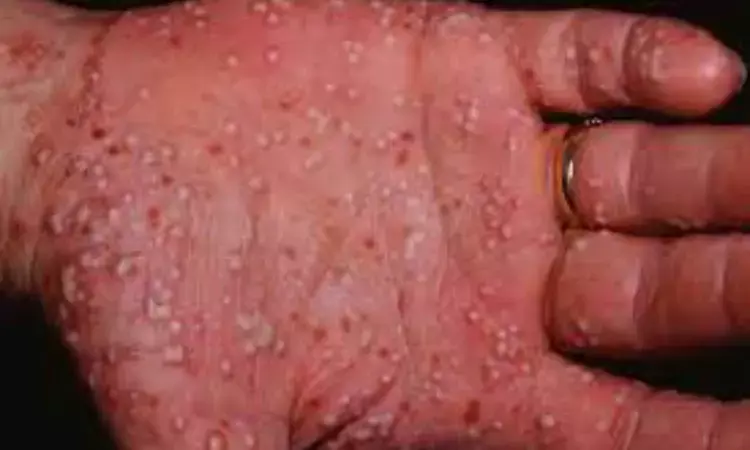- Home
- Medical news & Guidelines
- Anesthesiology
- Cardiology and CTVS
- Critical Care
- Dentistry
- Dermatology
- Diabetes and Endocrinology
- ENT
- Gastroenterology
- Medicine
- Nephrology
- Neurology
- Obstretics-Gynaecology
- Oncology
- Ophthalmology
- Orthopaedics
- Pediatrics-Neonatology
- Psychiatry
- Pulmonology
- Radiology
- Surgery
- Urology
- Laboratory Medicine
- Diet
- Nursing
- Paramedical
- Physiotherapy
- Health news
- Fact Check
- Bone Health Fact Check
- Brain Health Fact Check
- Cancer Related Fact Check
- Child Care Fact Check
- Dental and oral health fact check
- Diabetes and metabolic health fact check
- Diet and Nutrition Fact Check
- Eye and ENT Care Fact Check
- Fitness fact check
- Gut health fact check
- Heart health fact check
- Kidney health fact check
- Medical education fact check
- Men's health fact check
- Respiratory fact check
- Skin and hair care fact check
- Vaccine and Immunization fact check
- Women's health fact check
- AYUSH
- State News
- Andaman and Nicobar Islands
- Andhra Pradesh
- Arunachal Pradesh
- Assam
- Bihar
- Chandigarh
- Chattisgarh
- Dadra and Nagar Haveli
- Daman and Diu
- Delhi
- Goa
- Gujarat
- Haryana
- Himachal Pradesh
- Jammu & Kashmir
- Jharkhand
- Karnataka
- Kerala
- Ladakh
- Lakshadweep
- Madhya Pradesh
- Maharashtra
- Manipur
- Meghalaya
- Mizoram
- Nagaland
- Odisha
- Puducherry
- Punjab
- Rajasthan
- Sikkim
- Tamil Nadu
- Telangana
- Tripura
- Uttar Pradesh
- Uttrakhand
- West Bengal
- Medical Education
- Industry
Anakinra not found beneficial in palmoplantar pustulosis: Study

Palmoplantar pustulosis (PPP) is a rare, debilitating, chronic inflammatory skin disease that affects the hands and feet. Clinical, immunological and genetic findings suggest a pathogenic role for interleukin (IL)-1.
A group of researchers conducted a study to determine whether anakinra (an IL-1 receptor antagonist) delivers therapeutic benefit in Palmoplantar pustulosis (PPP).
This was a randomized (1 : 1), double-blind, two-staged, adaptive, UK multicentre, placebo-controlled trial [ISCRTN13127147 (registered 1 August 2016); EudraCT number: 2015-003600-23 (registered 1 April 2016)]. Participants had a diagnosis of PPP (> 6 months) requiring systemic therapy. Treatment was 8 weeks of anakinra or placebo via daily, self-administered subcutaneous injections. The primary outcome was the Palmoplantar Pustulosis Psoriasis Area and Severity Index (PPPASI) at 8 weeks.
The results of the study are:
A total of 374 patients were screened; 64 were enrolled (31 in the anakinra arm and 33 in the placebo arm) with a mean (SD) baseline PPPASI of 17·8 (10·5) and a PPP investigator's global assessment of severe (50%) or moderate (50%). The baseline adjusted mean difference in PPPASI favoured anakinra but did not demonstrate superiority in the intention-to-treat analysis [–1·65, 95% confidence interval (CI) –4·77 to 1·47; P = 0·30]. Similarly, secondary objective measures, including fresh pustule count (2·94, 95% CI –26·44 to 32·33; favouring anakinra), total pustule count (–30·08, 95% CI –83·20 to 23·05; favouring placebo) and patient-reported outcomes, did not show superiority of anakinra. When modelling the impact of adherence, the PPPASI complier average causal effect for an individual who received ≥ 90% of the total treatment (48% in the anakinra group) was –3·80 (95% CI –10·76 to 3·16; P = 0·285). No serious adverse events occurred.
Thus, no evidence for the superiority of anakinra was found. IL-1 blockade is not a useful intervention for the treatment of PPP.
Reference:
Anakinra for palmoplantar pustulosis: results from a randomized, double-blind, multicentre, two-staged, adaptive placebo-controlled trial (APRICOT)* by S. Cro, et al. published in the British Journal of Dermatology.
https://onlinelibrary.wiley.com/doi/full/10.1111/bjd.20653
Dr. Shravani Dali has completed her BDS from Pravara institute of medical sciences, loni. Following which she extensively worked in the healthcare sector for 2+ years. She has been actively involved in writing blogs in field of health and wellness. Currently she is pursuing her Masters of public health-health administration from Tata institute of social sciences. She can be contacted at editorial@medicaldialogues.in.
Dr Kamal Kant Kohli-MBBS, DTCD- a chest specialist with more than 30 years of practice and a flair for writing clinical articles, Dr Kamal Kant Kohli joined Medical Dialogues as a Chief Editor of Medical News. Besides writing articles, as an editor, he proofreads and verifies all the medical content published on Medical Dialogues including those coming from journals, studies,medical conferences,guidelines etc. Email: drkohli@medicaldialogues.in. Contact no. 011-43720751


